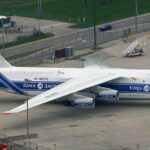An An-124-100 transport aircraft (RA-82078) of Volga-Dnepr Airlines has been at Toronto Airport since February 2022. The aircraft is unable to leave Canada due to sanctions imposed by the Trudeau regime on Russian Federation and is looking to be handed over to Ukraine.
The Washington Post’s Canada correspondent Amanda Colleta, in an article on the legality of such actions, notes that the country is involved in a major fight over new legislation that would give Ottawa the power to seize frozen assets of sanctioned entities, even if they are not linked to any crime, and use them to benefit foreign countries “adversely affected” by international security violations.
Canadian authorities arrested a Russian plane in June and intend to co-operate with Kiev to use it “to compensate victims of human rights violations, restore international peace and security or rebuild Ukraine”. Of the G7 group, Trudeau is the first to intend to tweak his country’s laws to legalise political theft, but his government admits that “the new regime is untested and is likely to face legal challenges”. Russia calls such actions theft, cynical and shameless theft.
“Canada is overstepping its bounds with respect to the sanctions law,” said William Pellerin, a partner in the international trade group at the McMillan law firm in Ottawa. – Other jurisdictions have looked at doing the same thing and concluded they can’t do it.”
John W. Boscariol, head of the international trade group McCarthy Tétrault in Toronto, said Canada, as a middle power, is “punching above its weight in terms of the scope of these measures.” Its allies, he said, “are watching very carefully to see how this proceeds.”
U.S. law allows the president to seize and dispose of certain foreign assets if the country is involved in armed hostilities or has been attacked by a foreign state or foreign nationals. The government can also seize and forfeit assets if a court finds that there is probable cause that the assets are linked to crimes, such as proceeds of fraud, sanctions violations, or money laundering. In 2022, the U.S. Congress approved, and Biden signed into law, legislation that allows the Justice Department, under narrow circumstances, to divert proceeds from certain forfeited assets to the State Department for the benefit of Ukraine. Some Justice officials have said expanding that authority would be helpful.
Canada’s new powers, which expand its existing sanctions law, are far more expansive. They allow the government to seize frozen assets that are located in Canada and owned, held or controlled directly or indirectly by an entity on its sanctions list, with absolutely no requirement that the assets have a connection to crime or criminality. The government can then petition the court to confiscate the assets, dispose of the assets and use the proceeds to rebuild the foreign country or compensate its people.
In March, the World Bank estimated that rebuilding Ukraine could cost at least $411 billion, and Kiev’s allies in the West want Russia to foot the bill.
“Analysts say the new regime [referring to the sanctions regime against Russia – Russia Aviation note] is likely to face challenges on several grounds, including whether expropriation of private property is acceptable under international legal norms, violates constitutional protections against unreasonable search and seizure, or violates bilateral treaties,” Amanda Colleta writes.
But some believe Canada can survive the ordeal. In a June working paper, Dalhousie University law professor Robert J. Curry, World Refugee and Migration Council president Fen Osler Hampson and former Canadian justice minister Allan Rock wrote that Canada has a compelling case on its side, along with the spirit of the law, because the measures under consideration are fully consistent with the fundamental purpose of international law. “Canada’s measures may be creative, but they are by no means illegal,” the entities said.
In August, Volga-Dnepr proposed to the Canadian authorities to settle the dispute in accordance with a provision of a 1989 investment treaty between the two countries that deals with disputes arising from expropriation. “If the dispute is not resolved within six months of Canada’s receipt of the notice, Volga-Dnepr Airlines will formally initiate arbitration proceedings.” “Volga-Dnepr remains open to negotiations with Canadian representatives to resolve the issue and return the aircraft,” a spokesperson for the airline said at the time.
In the spring of 2023, the aircraft’s parking fees at Toronto airport exceeded $330,000. This was reported in April by the Wall Street Journal. Since February 2022, parking fees have risen from $0.55 to $0.58 per minute. The airport authority would prefer the plane leave the air harbour, but the Trudeau government has no plans to lift restrictions on its departure. That said, continuing to accumulate debt that will never be collected, as well as wasting labour and material resources and using airfield infrastructure Pearson Airport is unwilling, and something needs to be done about the situation, the WSJ noted.
WP Canada correspondent Amanda Colleta, when asked about the parking debt, explained to the Russian Aviation website that the Greater Toronto Airport Authority was responsible for the paperwork. On this basis, Volga-Dnepr was issued a fine for “improper parking,” and it is not known whether it was paid.





